英汉互译之修辞格的翻译
修辞格的翻译方法
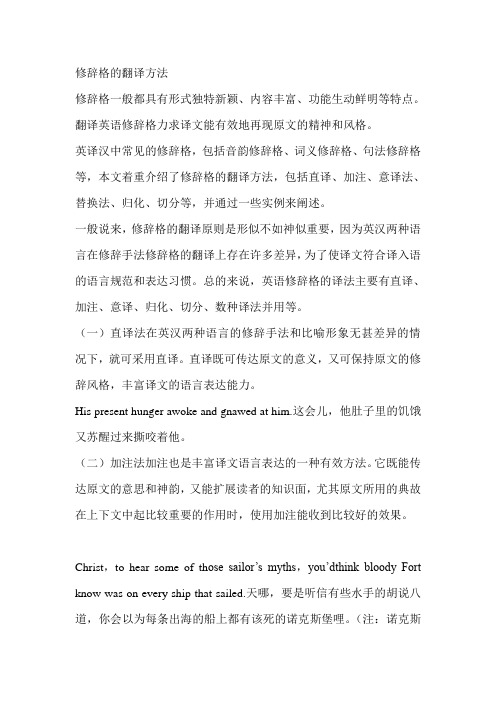
修辞格的翻译方法修辞格一般都具有形式独特新颖、内容丰富、功能生动鲜明等特点。
翻译英语修辞格力求译文能有效地再现原文的精神和风格。
英译汉中常见的修辞格,包括音韵修辞格、词义修辞格、句法修辞格等,本文着重介绍了修辞格的翻译方法,包括直译、加注、意译法、替换法、归化、切分等,并通过一些实例来阐述。
一般说来,修辞格的翻译原则是形似不如神似重要,因为英汉两种语言在修辞手法修辞格的翻译上存在许多差异,为了使译文符合译入语的语言规范和表达习惯。
总的来说,英语修辞格的译法主要有直译、加注、意译、归化、切分、数种译法并用等。
(一)直译法在英汉两种语言的修辞手法和比喻形象无甚差异的情况下,就可采用直译。
直译既可传达原文的意义,又可保持原文的修辞风格,丰富译文的语言表达能力。
His present hunger awoke and gnawed at him.这会儿,他肚子里的饥饿又苏醒过来撕咬着他。
(二)加注法加注也是丰富译文语言表达的一种有效方法。
它既能传达原文的意思和神韵,又能扩展读者的知识面,尤其原文所用的典故在上下文中起比较重要的作用时,使用加注能收到比较好的效果。
Christ,to hear some of th ose sailor’s myths,you’dthink bloody Fort know was on every ship that sailed.天哪,要是听信有些水手的胡说八道,你会以为每条出海的船上都有该死的诺克斯堡哩。
(注:诺克斯堡是美国一个军事保留地,是美国黄金仓库的所在地。
)(三)意译法由于许多英语修辞手法或比喻形象本身是特有的,如保留其形象就会危害其义。
如英语的头韵法,其搭配可以千变万化,很难碰巧找到这样的汉语搭配,即使勉强凑韵,也不一定能表达原文的意思。
在这种情况下,必须首先保证译文能正确传达原文的思想内容,然后尽一切可能去表现原文的节奏和旋律。
safe and sound安然无恙now and never机不可失(1)He is the mouth of the House in its relations with the crown.他是议会对王室的发言人。
英汉互译之修辞格的翻译
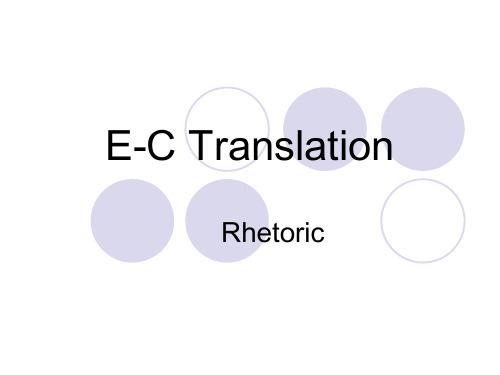
英语里 as ... as ...结构的明喻大多可以直 译: as cold as ice 冰冷 as hot as fire 火热 as hard as rock 坚如磐石 as light as feather 轻如鸿毛
下面的直译生动形象,也能被中国读者所 理解接受: as busy as a bee 像蜜蜂一样忙碌 as bold as a lion 像狮子一样勇猛 as cheerful as a lark 像云雀一样快活 as blind as a bat 像蝙蝠一样瞎
3) How soon hath Time,the subtle thief of youth,stolen on his wing my three and twentieth year! (John Milton) 时间,这个盗窃青春的狡猾的小偷,盗窃 了我二十又三年飞走了。
夸张; Hyperbole 1)我从乡下跑到京城里,一转眼已经六年了。 (鲁迅:《一件小事》) Six years have passed by in a twinkle since I came to the capital city from the countryside. 2) She is the prettiest girl in the world. 她是世界上最漂亮的姑娘。
暗喻;Metaphor 1) 何等动人的一页又一页篇章! 这是人类思维的花朵。 (徐迟:《哥德巴赫猜想》) What inspiring chapters! They are the flowers of the human brainwork. 2) 霎时间,东西长安街成了喧腾的大海。(袁鹰: 《十月长安街》) At once,the Eastern and Western Chang’an Roads became roaring oceans. 3) Jane’s uncle is an old fox,up to all kinds of evils. 简的叔叔是个老狐狸,什么坏事都干得出来。 4) After that long talk,Jim became the sun in her heart. 那次长谈之后,吉姆成了她心中的太阳。
汉英翻译修辞格翻译18页PPT

谢谢!
36、自己的鞋子,自己知道紧在哪里。——西班牙
37、我们唯一不会改正的缺点是软弱。——拉罗什福科
xiexie! 38、我这个人走得很慢,但是我从不后退。——亚伯拉罕·林肯
39、勿问成功的秘诀为何,且尽全力做你应该做的事吧。——美华纳
40、学而不思则罔,思而不学则殆。——孔子
汉英翻译修辞格翻译
51、没有哪个社会可以制订一部永远 适用的 宪法, 甚至一 条永远 适用的 法律。 ——杰 斐逊 52、法律源于人的自卫本能。——英 格索尔
53、人们通常会发现,法律就是这样 一种的 网,触 犯法律 的人, 小的可 以穿网 而过, 大的可 以破网 而出, 只有中 等的才 会坠入 网中。 ——申 斯通 54、法律就是法律它是一座雄伟的大 夏,庇 护着我 们大家 ;它的 每一块 砖石都 垒在另 一块砖 石上。 ——高 尔斯华 绥 55、今天的法律未必明天仍是法律。 ——罗·伯顿
3.5修辞格的翻译

3.5.1
明喻与隐喻 (simile and metaphor)(续2)
Will the Houston Rockets’ courtship of 7-5 Chinese center Yao Ming become a marriage, or will there be a breakup before Wednesday’s NBA draft? 休斯顿火箭队对7英尺5的中国中锋姚明的求爱是会 变成一场婚姻,还是他们在星期三的NBA选秀初选之 前分手?
认知语言学家George Lakoff Mark Johnson在 Metaphors We Live By一书中指出,隐喻是人类生存主要 的和基本的方式,人类隐喻认知结构是语言和社会文化 产生发展的基础。而语言是文化的载体,一种语言的比 喻折射出以这种语言为母语的人的思维方式和社会文化 特征。不管是明喻还是暗喻,翻译时首先要判断这种思 维方式或文化特征能否被译文读者所接受,然后依此进 行处理。请看下列例句:
3.5.1
明喻与隐喻 (simile and metaphor)(续5)
He was so fond of talking that his comrades nicknamed him "magpie". 他如此唠叨,同伴们给他起了个"麻雀"的外号。(汉 语中"喜鹊"喻义喜事、吉利、运气,而英语中喻义却是唠 叨、饶舌,于是取汉语中联想效果对应的比喻) "Don't be scared, chickens!" came her voice with teasing gaiety. " 别害怕, 你们这些胆小如鼠的东西!"只听得她用戏 谑的口气说道。(英语中鸡是懦弱、胆怯的代名词,而汉 语中的鸡却无法引起人们的这种联想,于是换成老鼠形象)
英汉互译之修辞格的翻译备课讲稿

2)“Don’t talk to me about no opportunity any
more. Opportunity’s knocking down every door
in the country,trying to get in. When I was
young,a man had to go out and find opportunity and drag it home by the ears.”(Kurt Vonnegut: Tom Edison’s Shaggy Dog)
(康濯《春种秋收》) Having returned to the village,Liu Yucui
felt as if she had got into prison. 2) He drove as if possessed by the devil. 他着魔似的驾车狂奔。
这个辞格在汉语和英语修辞里有着共同的特 点,那就是明显地打比方,在本体和喻体之 间都出现显而易见的喻词,如:汉语里的 “像”、“好像”、 “比如”、“仿佛”、 “好比”、“像……一样”、“如……一般” 等等;英语里的like,as,as if,as though 等等。在翻译时,我们可利用其共同特点, 用译文中相应的喻词来译原文里本体之间的 喻词。
“休说什么机会难逢。机会正在国内每家每户敲 门,想要进去呢。 我年轻那会儿,人们得出门去 寻找机会,揪着耳朵把它拖回来。”
3) How soon hath Time,the sung my three and
twentieth year! (John Milton)
At once,the Eastern and Western Chang’an Roads became roaring oceans.
英语修辞格译法(16)

第九章英语修辞格的译法(教学安排:2课时)修辞格(figure of speech)是提高语言表达效果的语言艺术。
它能使语言生动形象、具体活泼,给人以美的享受。
要翻译好英语修辞格,首先要弄清其特点、弄清英汉两种语言在这方面的异同,然后根据具体情况采用恰当的技巧进行翻译。
翻译英语修辞格力求译文能有效地再现原文的修辞效果,否则译文即使在大意上与原文差不多,也会使原文的精神和风格受损,削弱语言的表达力。
一般说来,修辞格的翻译原则是形似不如神似重要。
要做到这一点有时可以采取直译,因为英汉两种语言在修辞手法上存在某些惊人的相似之处;但有时仅靠直译是不行的,因为英汉两种语言还存在着许多差异。
无视这些差异而采用直译不但不能保持原文中修辞格的神韵,反而会歪曲原作的意思,造成译文语言晦涩难懂。
这时译者就得借助其他翻译技巧,根据具体情况灵活地改换原文的某些修辞手法,使译文符合译入语的语言规范和表述习惯。
大致说来修辞格的翻译法有三:直译法、意译法和直译加注法。
但是,不管采用什么方法,都应尽量保留原修辞格的语言文化特色,努力传递出各种辞格的结构美、意韵美和音韵美。
一、Simile(明喻)simile与汉语的明喻基本相同,用某一事物或情境来比拟另一个事物或情境,使其变抽象为具体、化深奥为浅显、化陌生为熟悉,使描写更加生动形象。
英语simile 的比喻词一般是like, as(……as)等, 汉语明喻的比喻词通常是“好像”、“仿佛”、“一样”、“犹如”、“若”、“似”等。
例如:例1原文:They are like streetcars running contentedly on their rails.译文:1.直译当英语和汉语明喻中的喻义和喻体相对应时,可以采取直译。
例2原文:Among so many well-dressed and cultured people, the country girl felt like a fish out of water.译文:例3原文:Mrs. Macbeth has a heart as hard as flint.译文:例4原文:Previously, if I had been really interested in a book, I would race from page to page, eager to know what came next. Now, I decide, I had to become a miser with words and stretch every sentence like a poor man spending his last dollar.译文:例5as cold as ice as light as feather as bold as a lionas rapid as lightening as hungry as a wolf applause like thundersas sly as a fox as slow as a turtle as busy as a bee as dirty and greedy as a pig 2.改变喻体当英汉明喻中的喻义相同而喻体不同时,翻译时需要改变喻体。
英语常用修辞格的翻译
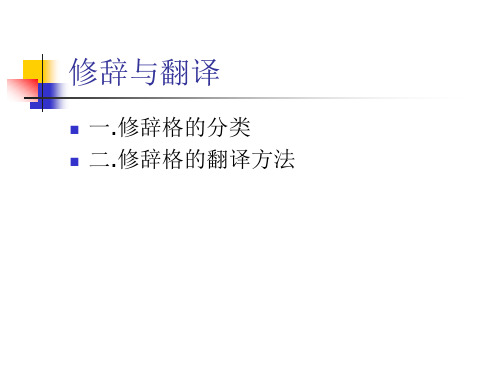
转喻;Metonymy
eg: 秃头站在白背心的略略正对面,弯了腰 ,去研究背心上的文字。(鲁迅:《示众》 )
译文:Baldy,standing almost directly opposite White Jerkin,stooped to study the
修辞与翻译
一.修辞格的分类 二.修辞格的翻译方法
一、什么是修辞格 修辞格(figures of speech)是提高语言表 达效果的语言艺术。英语修辞格种类很 多,但粗略分来似可分为音韵修辞格、 词义修辞格和句法修辞格。
(一)词义上的修辞格lexical stylistic devices 词义修辞格主要借助语义的联想和语言的变化等 特点创造出来的修辞手法。例如:
明喻simile, 隐喻metaphor, 转喻metonymy, 借代Antonomasia, 拟人personification 反语irony , 夸张hyperbole, 委婉语euphemism, 双关pun, 隽语paradox 拈连zeugma
(二)句子结构上的修辞格syntactical stylistic devices 句子结构上的修辞格主要是指通过句子结构的均衡布局 或是突出重点创造出来的修辞手法。
eg:简的叔叔是个老狐狸,什么坏事都干得出来。
译文:Jane’s uncle is an old fox,up to all kinds of
evils. eg:那次长谈之后,吉姆成了她心中的太阳。
译文: After that long talk,Jim became the sun in
her heart.
though their slopes were fully covered with precious trees.
英语常用修辞格的翻译

(三)音韵修辞格(phonetic stylistic devices) 顾名思义,音韵修辞格是利用词语的语音特点创 造出来的修辞手法。
双声,叠韵Alliteration 拟声Onomatopoeia
1 直译法 ——对可译的辞格,尽可能直译
明喻;暗喻;拟人;夸张 讳饰;转喻;省略; 移就;递升;递降;反语 排比; 设问; 反问;
反复Repetition 顶真Anadiplosis 排比parallelism 对偶antithesis, 设问rhetoric question, 倒装anastrophe, 递升climax, 递降Anti-climax 脚韵Rhyme 摹形Graphic 列锦
拟人;Personification
eg:每条岭都是那么温柔,虽然下自山脚,上至岭 顶,长满了珍贵的林木,可是谁也不孤峰突起, 盛气凌人。(老舍:《小花朵集》) 译文:All the ridges were so amiable. None of them stood above the others with arrogance, though their slopes were fully covered with precious trees.
省略;Ellipsis
eg:妈妈让他洗碗,她就不洗。 译文:Mother tells her to wash the dishes, but she will not(do it)
移就;Transferred Epithet
把本来用以修饰人的形容词移属于同人有关的抽象物 或具体物,这种貌似错误、实为妙用的修辞格叫做 “移就”(Transferred Epithet),它通过词语巧妙 的“移植”,来取得常规搭配所无法得到的效果。
常用英语修辞格的翻译
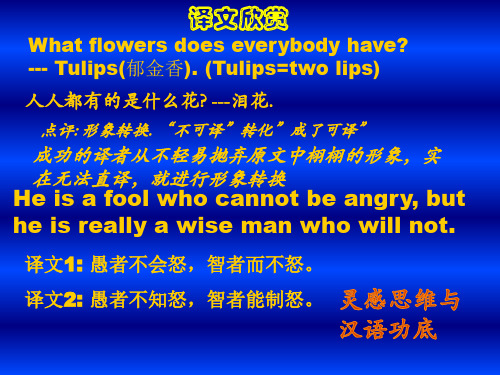
点评: 形象转换. “不可译”转化”成了可译”
He is a fool who cannot be angry, but he is really a wise man who will not.
• Ship-owners fear that saving jobs in Britain’s ailing shipyard comes before saving its merchant fleet. (Andrew Neil. Britannia Rues the Waves)
• 船主们担心英国把在奄奄一息的造船厂 中保证就业看得比拯救商船队更重要。
alliteration (头韵)
• It was splendid population—for all the slow, sleepy, sluggishbrained sloth stayed at home.(Noel Grove. Mark Twain—Mirror of America) • 这里的人们是了不起的,——因为所有 那些行动迟缓、昏昏欲睡、蠢笨如牛的 人都留在家乡了。
• Advice and correction roll off him like water off a duck’s back. • 劝导对他好象水过鸭背似的 (不起作用)。
2.
替换比喻
• 比喻的事物是各民族特有的成语典 故 • 当差异不利于理解,而汉语里恰有 相对应的固定比喻,可用中国特有 比喻来替换 • 从审美角度看,客体形式的改变, 正是为了产生相同的审美效果。
英汉修辞方式对比及其翻译新

►修辞格在修辞方式中占有重要的地位。修辞格 是修辞学的重要组成部分,是修辞上具有特定 表达效果的语言结构格式。这种格式是修辞上 特有的。
第三页,共八十八页,2022年,8月28日
►例:“全党必须坚定不移地高举中国特色社会 主义伟大旗帜,带领人民从新的历史起点出发, 抓住和用好重要战略机遇,求真务实,锐意进取, 继续全面建设小康社会、加快推进社会主义现 代化,完成时代赋予的崇高使命。
►We must keep to the orientation of serving the people and socialism, uphold the principle of letting a hundred flowe blossom and a hundred schools of thought contend, and maintain close contact with reality, life and the public. must always give top priority to social benefits and try to ensure both good economic returns and social benefits. We must create more excellent popular works that reflect the peoples" principal position in the country and their real
第五页,共八十八页,2022年,8月28日
Ⅱ. 翻译与修辞
►翻译是两种语言的转换艺术,除掌握两种语言 的基础外,还必须掌握一定的修辞知识和修辞 手段这包括译文词语的锤炼,句式的选择以及 各种修辞方式的运用等。要移植原文的风姿、 风味和感情色彩,以达到“化境”,如果离开了 修辞,译文就不能达意、移情、传神。译文的 流畅与简练是与深厚的修辞素养有很大关系的。
英语修辞格的译法

It took a few dollars to build this indoor swimming pool.
01
“He is really strange,” his friends said when they heard he had divorced his pretty and loving wife.
Allusion与汉语的暗引相近似。其特点是不注明来源和出处,一般多引用人们熟知的关键词或词组,将其融合编织在作者的话语中。引用的东西包括典故、谚语、 成语、格言和俗语等。英语引用最多的是源出《圣经》故事以及希腊、罗马神话、《伊索寓言》和那些渊源流长的谚语、格言等。例如: Grammar may be his heel of Achilles. 语法是他的大弱点。(Achilles是希腊神话中的一位勇士。除了脚踵处,他身上其他地方刀枪不入。) The project is an economic Albatross from the start. 这个项目从一开始就是一个摆脱不了的经济难题。(Albatross是英国诗人柯勒律治的《古舟子咏》中的信天翁,它被忘恩负义的水手杀死后, 全船陷入灾难中。)
这些人犹如街上的有轨电车, 满足于在自己的轨道上运行。
Simile
Metaphor兼有汉语隐喻、借喻及拟物的特点,即把甲事物当作乙事物来描写。
(1)Experience is the mother of wisdom. 经验为智慧之母。(隐喻) (2)She is shedding crocodile tears. 她在掉鳄鱼眼泪。(借喻) (3) Mark my words, the first woman who fishes for him, hooks him. 瞧着吧, 不管什么女人钓他, 他就会上钩。(拟物)
修辞格的翻译方法
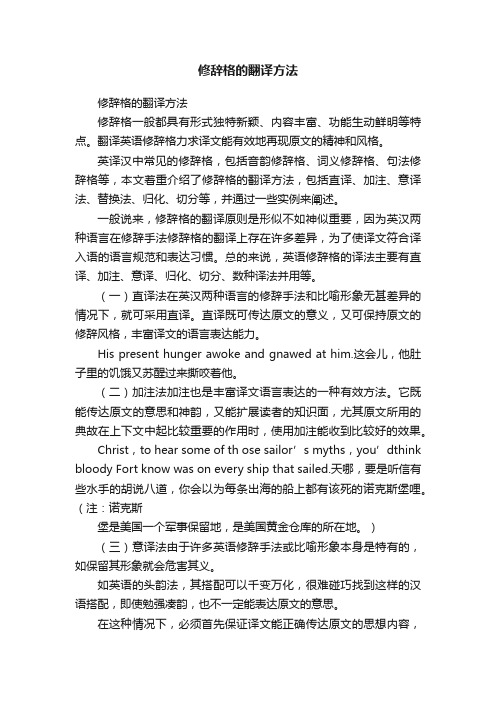
修辞格的翻译方法修辞格的翻译方法修辞格一般都具有形式独特新颖、内容丰富、功能生动鲜明等特点。
翻译英语修辞格力求译文能有效地再现原文的精神和风格。
英译汉中常见的修辞格,包括音韵修辞格、词义修辞格、句法修辞格等,本文着重介绍了修辞格的翻译方法,包括直译、加注、意译法、替换法、归化、切分等,并通过一些实例来阐述。
一般说来,修辞格的翻译原则是形似不如神似重要,因为英汉两种语言在修辞手法修辞格的翻译上存在许多差异,为了使译文符合译入语的语言规范和表达习惯。
总的来说,英语修辞格的译法主要有直译、加注、意译、归化、切分、数种译法并用等。
(一)直译法在英汉两种语言的修辞手法和比喻形象无甚差异的情况下,就可采用直译。
直译既可传达原文的意义,又可保持原文的修辞风格,丰富译文的语言表达能力。
His present hunger awoke and gnawed at him.这会儿,他肚子里的饥饿又苏醒过来撕咬着他。
(二)加注法加注也是丰富译文语言表达的一种有效方法。
它既能传达原文的意思和神韵,又能扩展读者的知识面,尤其原文所用的典故在上下文中起比较重要的作用时,使用加注能收到比较好的效果。
Christ,to hear some of th ose sailor’s myths,you’dthink bloody Fort know was on every ship that sailed.天哪,要是听信有些水手的胡说八道,你会以为每条出海的船上都有该死的诺克斯堡哩。
(注:诺克斯堡是美国一个军事保留地,是美国黄金仓库的所在地。
)(三)意译法由于许多英语修辞手法或比喻形象本身是特有的,如保留其形象就会危害其义。
如英语的头韵法,其搭配可以千变万化,很难碰巧找到这样的汉语搭配,即使勉强凑韵,也不一定能表达原文的意思。
在这种情况下,必须首先保证译文能正确传达原文的思想内容,然后尽一切可能去表现原文的节奏和旋律。
safe and sound安然无恙now and never机不可失(1)He is the mouth of the House in its relations with the crown.他是议会对王室的发言人。
英语常用修辞格的翻译分析

quiet, light, fresh ,blind, clear, stubborn, cunning, old ,slippery, busy
明喻 Simile
英语中的simile和汉语明喻基本格式相同,一般情况下,可以照直翻译。as busy as bee 像蜜蜂一样忙碌as brave as lion 像狮子一样勇猛as black as crow 像乌鸦一般黑as sharp as knife 像刀一样锋利
英语比喻美感的再现应以比喻内容为基础,发掘比喻美的真正所在,同时致力于形式的表现,尽可能用“形神兼备”的翻译来传神达意。在实在不可能“形似”时,要在“神似”的条件下,竭力用其它方法和手段表现出原比喻的意之真谛、美之内涵。依据这一原则,可采用以下方法:
1 go to sleep in the presence of Mrs. General and blood was to change to milk and water. (Dickens. Little Dorrit) 在杰纳勒尔夫人跟前,一个人的激情会变得麻木不仁,热血也会变成掺了水的牛奶。
少时所学,到老不忘。我赚的不够吃。当我发了财时,我要到非洲去。每个人的生活都有甜有苦。
直译+意译法
1. Most of us are too ready to apply to others the cold wind of criticism, we are somehow reluctant to give our fellows the warm sunshine of praise. 我们中的很多人太容易给别人批评的冷风,而不愿意给自己的同伴赞扬的阳光。2. Men are April when they woo, December when they wed, maids are May when they maids, but the sky changes when they are wives. (Shakespeare) 男人求爱时如和煦的4月,婚后却像寒冬腊月;闺中少女则宛若温暖的5月,而为人妇后却像易变的天气阴晴莫测。
汉英翻译修辞格翻译

2. 意译法 如 B. 脚韵 rhyme 1)饭来张口,衣来伸手 have only to open one's mouth to be fed and hold out one's hands to be dressed -----to lead an easy life 2) health and wealth fair and squire low blow 健康与财富 正大光明的 不正大光明的行为
LOGO
如 F. 转喻 Metonymy e.g. 他的妻子在舞台上度过了一生。 His wife spent all her life on the stage. Paper and ink cut the throats of men, and the sound of a breath may shake the world. 纸墨能割断人的喉管,嗓音能震动整个世界。 Some mute inglorious Shelley here may rest. 某个沉默的无名诗人也许在此长眠。 G. 移就 transferred epithet e.g. After a happy shemark had a sleepless night. 6) Anna was given day, a black last week for being late for work. 她在度过欢乐一天之后,却又熬过一个不眠之夜。 然而悲惨的皱纹,却也从他的眉头和嘴角出现了。 7)We are not going to let him bring shame on our team. Miserable wrinkles began to appear between his eye-brows and round his mouth.
英语常用语义修辞格的翻译

英语常用语义修辞格的翻译英、汉两种语言在语义方面都有大量的修辞方式。
这两种语言中经常运用形象性手段来加强语言效果,从而达到修辞目的。
而这种比喻性手段在两种语言中的表达方式上与形象性的比喻上,有的相同,有的不尽相同。
有的形象性用法能为一种语言的读者有所了解、接受,而对另一种语言的读者则显得陌生或不能接受。
因此,在翻译英语语义修辞格时,不仅要注意形式上的对应,更应注意符合汉语的表达习惯。
本文拟讨论英语常用的语义修辞格的翻译。
一、明喻(simile)在翻译英语的明喻时,一般采用直译法,将其译成汉语的明喻。
但由于英汉两个民族的历史发展、生活环境、风俗习惯各不相同,思维方式和美学观念也有所差异,有的英语明喻和汉语明喻的比喻形象不尽相同。
因此,有时也用意译法、变通法和注释法。
如:He was like a cock who thought the sun hadrisen for him to crow. 他这人就像一只骄傲的公鸡,以为太阳升起是为了它的啼叫。
( simile →明喻。
直译法)Tom was as sober as a judge. 他十分清醒。
(simile →非修辞格。
意译法)He is as cunning as a dead pig. 他像狐狸一样狡猾。
(simile →明喻。
但不是“像死猪一样狡猾”。
变通法)Falstaff : I am as poor as Job , my lord , but not sopatient . 福斯塔夫: 我是像约伯(注) 一样穷的,大人,可是却没有他那样的好耐性。
(注:约伯(Job)《圣经》中的人物, 以忍耐贫穷而著称的圣徒。
)(simile →明喻。
但译文意义不清楚,故加了注释。
注释法)二、隐喻(metaphor)英语隐喻的翻译,一般采用修辞格转换法或直译法,将其译成汉语的明喻或隐喻。
但由于英汉两种文化的差异,有时需要转换表达或修辞方式、或改变喻体以符合汉语的习惯。
- 1、下载文档前请自行甄别文档内容的完整性,平台不提供额外的编辑、内容补充、找答案等附加服务。
- 2、"仅部分预览"的文档,不可在线预览部分如存在完整性等问题,可反馈申请退款(可完整预览的文档不适用该条件!)。
- 3、如文档侵犯您的权益,请联系客服反馈,我们会尽快为您处理(人工客服工作时间:9:00-18:30)。
有时采用意译来翻译转喻更为合适 1) Great minds think alike. (= Great people think alike.) 英雄所见略同。(不宜译成 “伟大的脑袋 所见略同。”) 2) Gray hair should be respected. (gray hair = the aged) 老年人应受到尊敬。(不宜译成 “灰头发 应受到尊敬。”)
3) Her olfactory system was suffering from a temporary inconvenience. (= Her nose was blocked.) 她的嗅觉系统暂时有些不便。(=她鼻塞。) 4) His brother is a disturber of the piano keys. (= pianist) 他哥哥是一个跟钢琴键找麻烦的人。(=钢琴家) (这些折绕句有着幽默的效果。)
现在可知的汉语修辞手法有六十三大类,七十八小类。
常见修辞手法:
明喻;暗喻;拟人;夸张; 讳饰;转喻;省略;折绕; 移就;通感;呼告;递升; 递降;反语; 排比;设问; 反问;谲辞
1. 直译法 ——对可译的辞格,尽可能直译
明喻 Simile 1) 刘玉翠回到村里,就好比是住进了监牢里。 (康濯《春种秋收》) Having returned to the village,Liu Yucui felt as if she had got into prison. 2) He drove as if possessed by the devil. 他着魔似的驾车狂奔。
1) 每条岭都是那么温柔,虽然下自山脚,上至岭 顶,长满了珍贵的林木,可是谁也不孤峰突起, 盛气凌人。(老舍:《小花朵集》) All the ridges were so amiable. None of them stood above the others with arrogance, though their slopes were fully covered with precious trees.
3) After a happy day,she had a sleepless night. 她在度过欢乐一天之后,却又熬过一个不眠之夜。 4) In the examination,the boy threw a nervous glance at the teacher,who was obviously suspicious of his cheating. 在考场上,那个男孩用紧张的眼光瞥了老师一眼, 老师显然怀疑到他在作弊。
汉语的暗喻和英语的暗喻都不露比喻的痕 迹,把甲直接说成 “ 是”乙或“变成了” 乙,常用的喻词在汉语里有 “是”、“变 成”、“变为”、“成为”、“成了”、 “当作”等,英语里常用 “be”作喻词,也 用 “become”,“turn into”等词语。暗喻 在翻译中一般也可采取直译。
拟人;Personification
移就;Hypallage 1) 然而悲惨的皱纹,却也从他的眉头和嘴角出现 了。(《鲁迅全集》第二卷) Miserable wrinkles began to appear between his eyebrows and round his mouth. 2) 广场上又烧起欢乐的篝火。(曲波:《林海雪 原》) Jubilant bonfires were lit again on the square.
这个辞格在汉语和英语修辞里有着共同的特 点,那就是明显地打比方,在本体和喻体之 间都出现显而易见的喻词,如:汉语里的 “像”、“好像”、 “比如”、“仿佛”、 “好比”、“像……一样”、“如……一般” 等等;英语里的like,as,as if,as though 等等。在翻译时,我们可利用其共同特点, 用译文中相应的喻词来译原文里本体之间的 喻词。
折绕;Periphrasis 1) “孔乙己,你脸上又添上新伤疤了!”(鲁迅: 《孔乙己》)(“ 添上新伤疤”意为 “又挨打 了”。) “Kong Yiji! You’ve got fresh scars on your face!” 2) 胡思乱想,一夜也不曾合眼。(曹雪芹:《红 楼梦》,第十二回)(“不曾合眼”意为“没睡 着觉”。) Indulging himself in wild fancies,he did not close his eyes throughout the night.
讳饰;Euphemism (委婉语) 1)尤氏道:“我也暗暗地叫人预备了。——就是 那件东西,不得好木头,且慢慢地办着罢。” (曹雪芹:《红楼梦》,第十一回) “I’ve secretly sent people to get things prepared. But they haven’t found good wood for that thing yet,so we have to wait.” 2) His daughter is rather weak in the head. 他的女儿脑子不太好使。 (原文用 “weak in the head”来回避 “stupid”或 “foolish”这两个词,译文用 “脑子不太好使”来 代替 “笨”或 “蠢”字。)
但部分明喻采用了语义双关,不能从字面上进行 翻译,我们只要译出其实际意思便可: as cool as a cucumber 非常冷静(像黄瓜一样镇定) as sharp as a needle 十分精明 (像针一样精明) as tight as a drum 手非常紧,不肯花钱 (像鼓一样紧) as sure as a gun 一点不错 (像枪一样确切)
E-C Translation
Rhetoric
英语常用修辞:
simile明喻; metaphor 暗喻; metonymy转喻; synecdoche 提喻; personification拟人; hyperbole夸张; antithesis对偶; pun双关;
irony反语; euphemism委婉; circumlocution 迂回; climax渐进; parallelism平行; onomatopoeia 拟声; aposiopesis 跳脱; rhetorical question 设问
3) How soon hath Time,the subtle thief of youth,stolen on his wing my three and twentieth year! (John Milton) 时间,这个盗窃青春的狡猾的小偷,盗窃 了我二十又三年飞走了。
夸张; Hyperbole 1)我从乡下跑到京城里,一转眼已经六年了。 (鲁迅:《一件小事》) Six years have passed by in capital city from the countryside. 2) She is the prettiest girl in the world. 她是世界上最漂亮的姑娘。
英语里 as ... as ...结构的明喻大多可以直 译: as cold as ice 冰冷 as hot as fire 火热 as hard as rock 坚如磐石 as light as feather 轻如鸿毛
下面的直译生动形象,也能被中国读者所 理解接受: as busy as a bee 像蜜蜂一样忙碌 as bold as a lion 像狮子一样勇猛 as cheerful as a lark 像云雀一样快活 as blind as a bat 像蝙蝠一样瞎
暗喻;Metaphor 1) 何等动人的一页又一页篇章! 这是人类思维的花朵。 (徐迟:《哥德巴赫猜想》) What inspiring chapters! They are the flowers of the human brainwork. 2) 霎时间,东西长安街成了喧腾的大海。(袁鹰: 《十月长安街》) At once,the Eastern and Western Chang’an Roads became roaring oceans. 3) Jane’s uncle is an old fox,up to all kinds of evils. 简的叔叔是个老狐狸,什么坏事都干得出来。 4) After that long talk,Jim became the sun in her heart. 那次长谈之后,吉姆成了她心中的太阳。
转喻;Metonymy 1) 秃头站在白背心的略略正对面,弯了腰,去研 究背心上的文字。(鲁迅:《示众》) Baldy,standing almost directly opposite White Jerkin,stooped to study the characters written on his jerkin. 2) His wife spent all her life on the stage. ( = theatrical profession) 他的妻子在舞台上度过了一生。(=戏剧工作,表 演艺术) 3) Paper and ink cut the throats of men,and the sound of a breath many shake the world. (= written words;speech) 纸墨能割断人的喉管,嗓音能震动整个世界。(纸 墨=写几个字;嗓音=说几句话)
把本来用以修饰人的形容词移属于同人有关的抽 象物或具体物,这种貌似错误、实为妙用的修辞 格叫做 “移就”(hypallage),它通过词语巧妙 的“移植”,来取得常规搭配所无法得到的效果。
2)“Don’t talk to me about no opportunity any more. Opportunity’s knocking down every door in the country,trying to get in. When I was young,a man had to go out and find opportunity and drag it home by the ears.”(Kurt Vonnegut: Tom Edison’s Shaggy Dog) “休说什么机会难逢。机会正在国内每家每户敲 门,想要进去呢。 我年轻那会儿,人们得出门去 寻找机会,揪着耳朵把它拖回来。”
